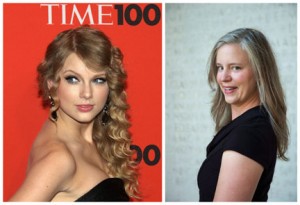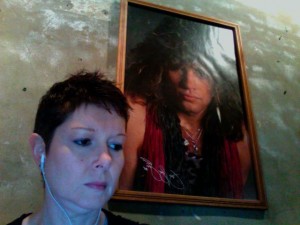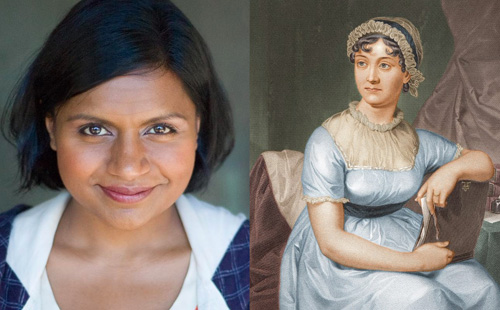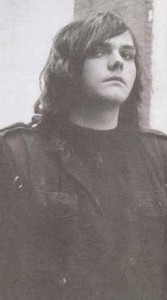
So I have a new book out today, and I’m supposed to write a blog post about it because that’s what one does. But instead I thought I’d write one about Taylor Swift. It’s not actually that much of a stretch because there are shades of Taylor Swift in my new book. Amy, my heroine, looks a lot like Taylor (in fact, she even talked herself into a club once when the bouncer mistook her for her celebrity doppelganger). And when she’s dumped in spectacular fashion at the beginning of the book, she wishes she had Taylor’s ability to chancel her heartbreak into sly songs about her exes, converting breakups into platinum records. And then of course there’s an epic scene in the book in which Amy and her girlfriends do karaoke to “Long Live,” which might be my all-time fave Tay song.
If you know me, or you follow me on Twitter, none of this is a surprise because you already know that I am a superfan. What can I say? I have that kind of celebrity crush on her where I feel like we could be BEST FRIENDS, if only she’d give me a chance. Except in this case, I also feel sort of maternal. I get really excited when she succeeds, and I’m thrilled by her current “girlfriends before boys” phase. So it’s like she’s a cross between my imaginary best friend and my imaginary daughter. (I hasten to add, though, that my imaginary pregnancy with my imaginary daughter happened in my teen years. My EARLY teen years.)
But why? Why am I such a superfan? People ask me this a lot. The obvious answer is that I love her music. It’s clever and infectious, and it makes me happy. But when I interrogate that sentiment further and ask WHY I love her music so much, the answer I come up with is that Taylor Swift is a master of point of view.
Writers talk about point of view all the time. In a crude sense, point of view in a book is about who is narrating. Who knows what, and when do they know it? In many, but not all, romance novels, you get some of the story told from the point of view of the heroine and some from the point of view of the hero. The vogue in romance right now is something called deep point of view. Google it for a more detailed explanation, but basically, we’re talking about a filtering everything through a character. There is no omniscient narrator. For example, the hero walks into a room. Maybe it’s a room with a really cool decor. But if our hero is not an aesthete, not the kind of guy who notices that stuff, we as the readers cannot be told about the teal antique Persian rug over the glossy walnut-stained hardwood. It might be there, but if he doesn’t notice it, we don’t get to know about it. But by seeing everything through his eyes, we get to know more about him as a character. We get a richer, more immersive experience of these characters, and hence of the story. (And if that rug is important, our heroine will have to remark on it later. Or our hero will have to spill his drink on it. Or something.)
Taylor Swift has always been really good at deep point of view. Earlier in her career, I always said that I liked her music because she wrote songs that sounded like songs a teenager would write. She captured an experience I remembered well. Many of her songs reminded me of stuff I would write in my diary. “Fifteen” is about being fifteen. “Mean” captures perfectly the experience of being bulled. Mind you, I didn’t love all her songs from this era. Some of them seemed a little melodramatic to me. But, perhaps counter-intuitively, I liked that. Being a teenager IS melodramatic.
(As an aside, I also think it’s telling that unlike many of her peers, the Taylor Swift of this era didn’t seem to be in any huge rush to grow up, to present as more mature than her actual years. Lots of moms I knew liked this about her because, in a hypersexual culture that fetishizes women’s bodies, they appreciated that their daughters had a role model who wasn’t playing this game.)
So what I’m saying is that Taylor Swift was a teenager writing about being a teenager. It’s simple, really, even though it’s kind of revolutionary.
And here’s why: At the same time she was mastering deep point of view, she was simultaneously the omniscient narrator of her own life. She had a perspective that was really rather amazing, both in general, but also given her youth. She was a teenager, yes, and perfectly capturing that experience, but part of the reason she was so perfectly capturing it was because she somehow knew what it was going to be like later when she was no longer a teenager. She had the wisdom or imagination or the something to know that her point of view was fleeting. That is some serious zen shit. People spend years in yoga and/or therapy trying to get there.
As an example, think about the song “Mean.” On the one hand she’s all:
You, with your switching sides
And your wildfire lies and your humiliation
You have pointed out my flaws
as if I don’t already see them
I walk with my head down…
We’ve all been there, right? (Well, I have!)
But in the same song, she steps back and says:
Someday, I’ll be living in a big old city
And all you’re ever gonna be is mean
She goes on to imagine her tormenter years from now, drunk in a bar, ranting on with no one listening. She’s doing deep point of view, but she’s also the omniscient narrator. Brilliant.
Or take my favourite song, “Long Live.”
It’s one of those songs where it’s hard to tell exactly what it’s about, but in a good way that lets you project onto it. To me, it seems to be about either a couple or a pair of friends getting away with something, playing a prank and reveling in their own success. It’s anthemic and delightfully defiant. But there’s also a built in sense of loss in the song as the narrator instructs herself to “remember this feeling.” And in the same breath that she asks her companion to promise that they’ll be together forever (you can practically see the pinky-swears) she’s telling him to show his future children pictures of her.
I’ve been talking about her early songs, but of course Taylor is not a teenager anymore. But she’s kept up with the perspective shifting, though it’s gotten more sophisticated.
“Out of the Woods” is a master class in this sense. Unlike in “Mean,” where she’s mostly shifting perspectives between verse and chorus, here she is doing both things at once all the time, infusing the whole song with this dual point of view.
We were built to fall apart
Then fall back together
Your necklace hanging from my neck
The night we couldn’t quite forget
When we decided
To move the furniture so we could dance,
Baby, like we stood a chance
Two paper airplanes flying, flying, flying
I find the image of moving the furniture to dance so perfectly indelible. But at the same time, we know—because she knows—it’s fleeting. It isn’t going to last. The fleetingness that we only know because of her omniscient narrator perspective is infused in the moment that is so perfectly crystalized because of her deep point of view perspective.
But it’s not all serious! She’s gone delightfully and wackily meta in “Blank Space:”
“Cause we’re young and we’re reckless, we’ll take this way too far.”
And also, come on, I’m acting like we’re in grad school here. None of this would matter if she wasn’t also writing the catchiest, danciest pop songs known to humankind.
I love her. Mr. Holiday loves her (though I take the credit for slowly and determinedly converting him). My five-year-old son loves her. There has been many an early morning “We Are Never Ever Getting Back Together” dance party in my house. And perhaps less glibly, there has also been many a family dance party to “Stay,” which I maintain is one of the sweetest and most realistic love songs ever written.
So there you go. My ode to Tay, master of point of view. And, hey, maybe you want to buy my new book. It’s probably not as good as a Taylor Swift album, but I try.






